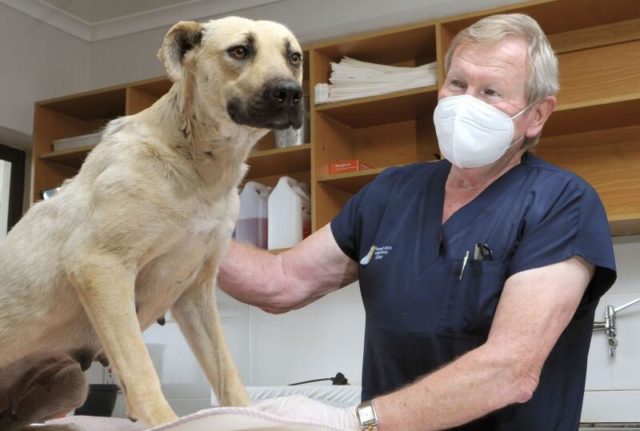SOUTH Africa’s vets want to be included in the government’s national vaccine rollout plan citing professional safety concerns.
The South African Veterinarian Association (Sava), together with the Black Veterinary Forum (BVI), issued a request to the departments of Health and Agriculture, Land Reform and Rural Development for animal health and welfare workers to be added to the phased roll-out of the Covid-19 vaccine, citing professional safety concerns.
Dr Leon de Bruyn, chief executive of the association, said the sector had not been considered.
“It’s been problematic,” he explained. “We’ve had two colleagues pass on a week ago. We had a husband and wife veterinary team pass away late last year. Quite a few of our clinic and health workers have been affected.
“We obviously try and maintain social distancing and wear our masks to a point, but we are integral in food supply. We are the custodians of animal welfare. A lot of that entails being in relative proximity to the people handling the animals. There is a risk, there’s no doubt about that.”
The association cited the government’s plan released which breaks down the phases in which vaccinations are prioritised to different groups. Phase 1 of the plan will include health care workers identified according to different risk categories, while Phase 2 lists other essential workers, people in congregate settings, persons aged 60 and older, and persons aged 18 and older with comorbidities. Though having been classified as essential workers during the lockdown, animal health care and welfare workers are not listed in the Phase 2 roll-out.
“We fully understand that the human health care workers should be vaccinated in Phase 1, but we certainly should fall under the essential workers in Phase 2,” De Bruyn said. “We understand if that’s an oversight, if they didn’t necessarily think of everyone when they were drawing up that document.”
De Bruyn added their request had been acknowledged by the Department of Agriculture, Land Reform and Rural Development, but they had received no response from the Health Department.
Health Department spokesperson Popo Maja said the list of essential workers in the published roll-out plan was not yet concluded, and they were still learning from countries that had already commenced their vaccine roll-outs.
“Everyone is included in the vaccine roll-out plan,” he said. “It is a matter of prioritising front-line health workers. In that category, health workers who interact with patients directly and daily will be prioritised. Animal health care workers are important. And their concerns are considered. We learn as we go. None of us have any experience in the roll-out of a vaccination programme of this magnitude.”
Groups such as the Animal Welfare Society of South Africa have had to introduce strict protocols to avoid infections.
“At the society, we’ve had very strict protocols since we started,” said society chief executive and practising veterinarian Dr John McMullen.
“We see about 300 people every weekend from anywhere in Cape Town and the Cape metropole. Somebody goes outside and makes everybody fill out a form, asking if they had been in contact with anybody and before we even consider seeing their animal. We only allow one person at a time into the facility and consulting rooms.”
McMullen noted the lives of fellow veterinarians he knew had been lost to the pandemic. “We are regarded as an essential service and have been since lockdown,” he said. “We have worked right through. There is a great danger in the front-line.”
Other groups, such as the Mdzananda Animal Clinic in Khayelitsha, have had to implement half-staff rotations to protect its volunteers.
“This was done so that, if one staff member got infected and the team needed to isolate, the other half staff team could take over,” said fund-raising and communications manager Michelle du Plessis. “This was to ensure the clinic would never need to close as this would be detrimental to the animals and pet owners. This, however, had a large impact on our staff as it was half a team working with more pet patients than normal.”
The National Council of SPCAs (NSPCA) backed the call by Sava for workers to be vaccinated.
“Animal care workers place themselves on the front-line just as other essential workers, even in Level 5 of the lockdown,” said NSPCA spokesperson Keshvi Nair. “Animals cannot be left to suffer, therefore, we must place ourselves at risk to stop that suffering and should be afforded that protection when it becomes available so we can continue to do our work.”
Tamsin Nel, founder of the South Africa Mass Sterilisation Trust (SA.MAST) clinic in Khayelitsha, said the possibility of omission was disappointing, but not surprising.
“It is the brave men and woman working in the veterinary and animal welfare sector who prevent a myriad of debilitating conditions from infecting the general population, the majority of which, if they were to suffer from a zoonotic disease or infection, would seek medical intervention from already overwhelmed state run and funded clinics and hospitals,” Nel said.
“As a country, we are already suffering from a critical shortage of veterinary staff and this will only get worse if our leaders continue to underestimate the positive health and safety role we play in South Africa.”








